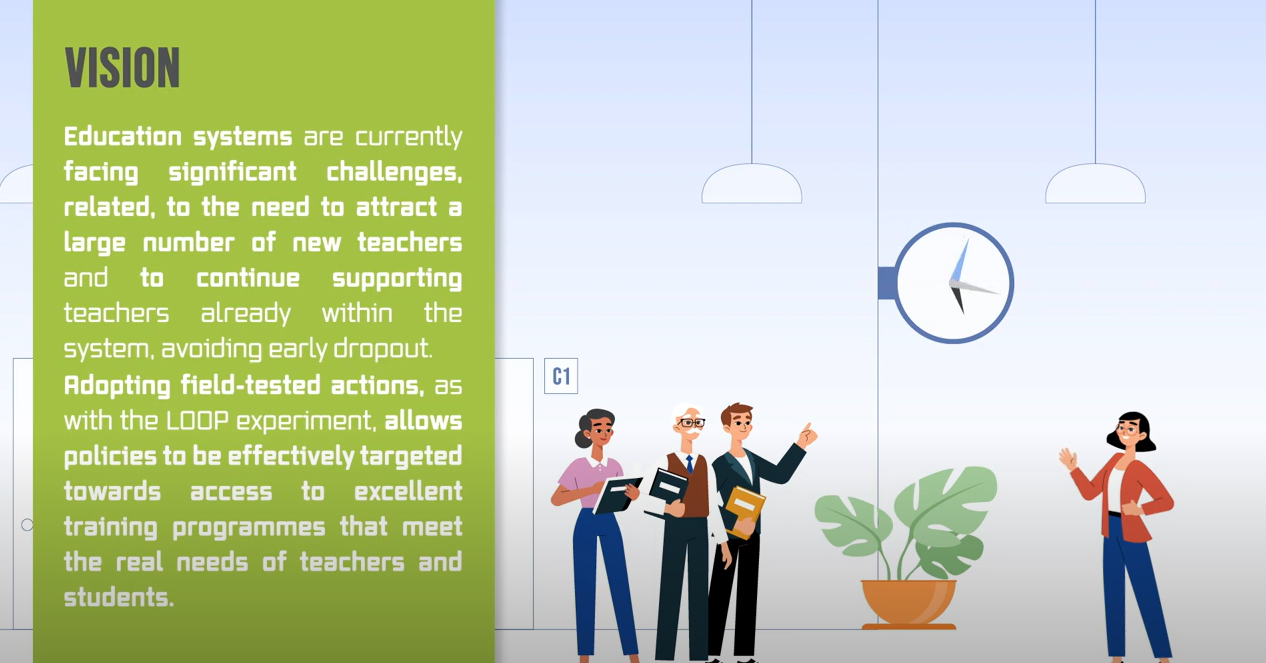
LOOP Project White Paper: Empowering Teachers – Enhancing Teacher Induction through mentoring Activities
Education systems are currently facing significant challenges, related to the need to attract a large number of new teachers and to continue to support teachers already in the system, avoiding early departure.
In addition, the current reality in schools is different, with new teachers arriving, some without the appropriate professional qualifications to carry out their duties, as a result of teacher shortages. The induction programme is therefore essential for them to develop a wide range of competencies and take ownership of the professional culture.
The adoption of field-tested actions, such as the LOOP experiment, makes it possible to effectively guide policies towards access to excellent training programmes that respond to the real needs of teachers and students.
The White Paper contains a set of essential recommendations to support decision-making, providing valuable information on the experience gained during the development of the LOOP project. These recommendations can be appropriated by different actors, in the certainty that their ultimate goal is to improve the services provided by schools, a goal that can only be truly achieved through the quality of the support provided to teachers.
In this vein, the ultimate aims of the LOOP White Paper are:
- To support different contexts in identifying gaps in teacher induction and professional development programmes;
- To increase the attractiveness of the profession;
- To point out opportunities to develop competencies, support new professionals and increase the motivation of those already in the profession.
To this end, the LOOP White Paper outlines four different scenarios for action, in which a series of measures are recommended:
- Scenario 1 – Unlocking teacher development and career progression: aims to generate new levels of professional motivation and prevent teachers from leaving the profession prematurely by reviewing the teaching career, to increase its attractiveness to teachers at different stages of their professional career.
- Scenario 2 – Turning knowledge into action in teacher training: the central aim is to establish a comprehensive teaching immersion programme, especially aimed at early-career teachers.
- Scenario 3 – Unlocking teacher potential through mentoring: the central aim is to implement formal, certified and/or accredited teacher mentoring programmes to reinforce the implementation of induction programmes.
- Scenario 4 – Support mechanisms in organisational structures for induction: pursuing the common goal of successively improving the quality of the service provided by schools.
Thus, although some of the recommendations imply morphological changes at a political level, namely to the Teaching Career Statute, there is no doubt that concrete actions have already been implemented within the scope of LOOP, as can be seen on this website.
The adoption of the recommendations is based on the quality of the LOOP products, which was and is recognised by all teachers, particularly those who took part in the construction of LOOP and intervened freely in the pilot project and, as the strategy adopted was bottom-up, the participants took ownership of the products as their own and gave them meaning.
The LOOP White Paper calls on the various decision-makers to look at LOOP and its potential, whether in terms of creating new regulations, improving existing ones or supporting schools and the challenges they face on a daily basis. It therefore stresses the need to promote a supportive environment for teaching professionals, both new teachers and mentor teachers, thereby galvanising the success of mentor-based induction programmes such as LOOP.








